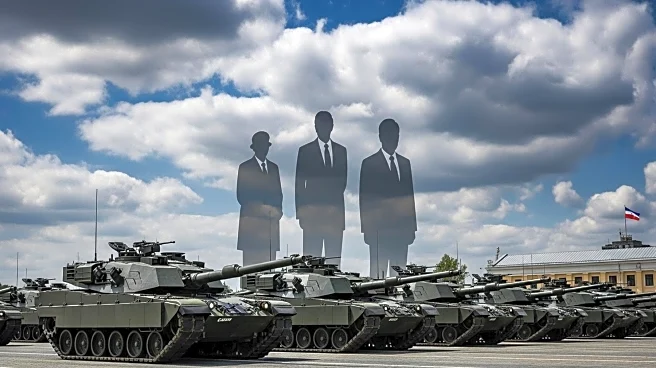What's Happening?
North Korean leader Kim Jong Un has traveled to China to attend a military parade marking the 80th anniversary of Japan's surrender in World War II. This event, held in Beijing, will see Kim alongside Chinese President Xi Jinping and Russian President Vladimir Putin. Kim's visit follows the Shanghai Cooperation Organisation summit in Tianjin, where Xi and Putin criticized Western dominance. This marks Kim's first participation in an event with multiple world leaders, presenting a significant diplomatic opportunity. The visit underscores North Korea's alignment with China and Russia against Western policies.
Why It's Important?
Kim Jong Un's attendance at the military parade highlights North Korea's strategic positioning within a shared security narrative with China and Russia. This alliance could impact global diplomatic relations, especially concerning U.S. policies. North Korea's reliance on China and Russia for economic and diplomatic support is reinforced, potentially affecting international sanctions and negotiations. The event also emphasizes the evolving world order, where North Korea seeks to elevate its standing by aligning with major powers against Western influence.
What's Next?
The gathering of Kim, Xi, and Putin may lead to further diplomatic and military collaborations among the three nations. North Korea's involvement in supporting Russia's war in Ukraine, with thousands of troops deployed, indicates a deepening military alliance. Future deployments and military cooperation could escalate tensions with Western countries, particularly the U.S. and its allies. Observers will watch for any new agreements or statements that might emerge from this meeting, potentially affecting global security dynamics.
Beyond the Headlines
The participation of Kim Jong Un in this event may have long-term implications for North Korea's international relations. It could signal a shift towards more active engagement in global affairs, moving away from its isolated stance. The alliance with China and Russia might also influence North Korea's domestic policies, as it seeks to balance internal challenges with external support. Additionally, the event could impact regional security, prompting neighboring countries to reassess their diplomatic strategies.












